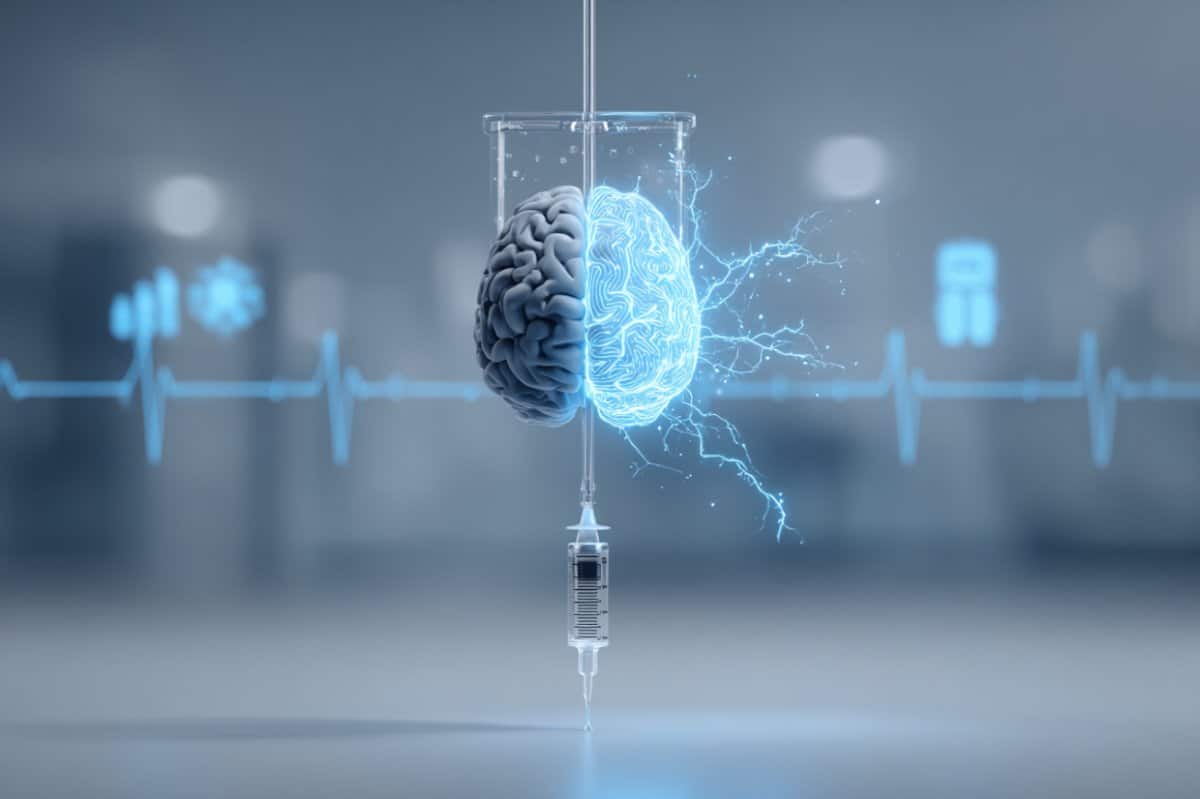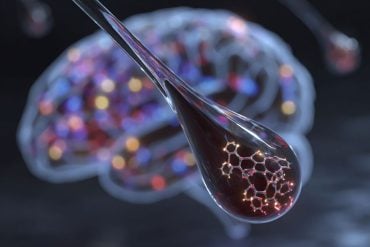Summary: A large randomized and blinded clinical trial has found no additional benefit of repeated ketamine infusions over standard inpatient care for treating major depression. The study compared ketamine with a psychoactive placebo and found no meaningful differences in objective or self-reported depression scores, cognition, or quality of life.
Researchers caution that previous studies may have overestimated ketamine’s antidepressant efficacy due to unblinding and placebo effects. The findings emphasize the importance of rigorous trial design before adopting ketamine more widely for depression treatment.
Key Facts:
- No Added Benefit: Ketamine did not outperform midazolam in reducing depression symptoms or improving quality of life.
- Placebo Effect Concern: Most participants correctly guessed their treatment, possibly inflating perceived effects.
- Clinical Implication: Findings call for recalibrating expectations about ketamine’s antidepressant potential and ensuring careful evaluation before clinical adoption.
Source: TCD
Findings from a randomised and blinded clinical trial investigating repeated ketamine infusions for treating depression have revealed no extra benefit for ketamine when added onto standard care for people admitted to hospital for depression.
The paper is published in the journal JAMA Psychiatry today.

The KARMA-Dep (2) Trial involved researchers from St Patrick’s Mental Health Services, Trinity College Dublin, and Queens University Belfast, Ireland. It was led by Declan McLoughlin, Research Professor of Psychiatry at Trinity College Dublin and Consultant Psychiatrist at St Patrick’s Mental Health Services.
Depression has been recognised by the World Health Organization as a leading cause of disability globally. According to the Health Research Board’s most recent report, there were 15,631 adult admissions to psychiatric services in Ireland in 2023. Similar to previous years, depressive disorders accounted for the highest proportion (about 24%) of all admissions.
Studies show that about 30% of people with depression do not respond sufficiently well to conventional antidepressants, which mostly target monoamine neurotransmitters, for example serotonin, dopamine and noradrenaline. There is thus a need for new treatments.
One such novel treatment is the dissociative anaesthetic ketamine when given intravenously in low sub-anaesthetic doses. Ketamine works differently to other antidepressants and is believed to mediate its effects in the brain through the chemical messenger glutamate.
Single infusions of ketamine have been reported to produce rapid antidepressant effects, but these disappear within days. Nonetheless, ketamine is increasingly being adopted as an off-label treatment for depression even though the evidence to support this practice is limited.
One possibility is that repeated ketamine infusions may have more sustained benefit. However, this has so far been evaluated in only a small number of trials that have used an adequate control condition to mask the obvious dissociative effects of ketamine, e.g. altered consciousness and perceptions of oneself and one’s environment.
KARMA-Dep 2 is an investigator-led trial and was funded by the Health Research Board. The randomised trial was developed to assess antidepressant efficacy, safety, cost-effectiveness, and quality of life during and after serial ketamine infusions when compared to a psychoactive comparison drug midazolam.
Trial participants were randomised to receive up to eight infusions of either ketamine or midazolam, given over four weeks, in addition to all other aspects of usual inpatient care.
The trial findings revealed that:
- There was no significant difference between the ketamine and midazolam groups at the end of the treatment course on the trial’s primary outcome, which was an objective measurement of depression. This was assessed with the commonly used Montgomery-Åsberg Depression Rating Scale (MADRS).
- There was no significant difference between the two groups at the end of the treatment course on a subjective, patient-rated, scale for depression. This was assessed with the commonly used Quick Inventory of Depressive Symptoms, Self-Report scale (QIDS-SR-16).
- No significant differences were found between the ketamine and midazolam groups on secondary outcomes for cognitive, economic or quality-of-life outcomes.
- Despite best efforts to keep the trial patients and researchers blinded about the randomised treatment, the vast majority of patients and raters correctly guessed the treatment allocation. This could lead to enhanced placebo effects.
Speaking about the impact of the findings, Declan McLoughlin, Research Professor of Psychiatry at Trinity College Dublin and Consultant Psychiatrist at St Patrick’s Mental Health Services, said:
“Our initial hypothesis was that repeated ketamine infusions for people hospitalised with depression would improve mood outcomes. However, we found this not to be the case.
“Under rigorous clinical trial conditions, adjunctive ketamine provided no additional benefit to routine inpatient care during the initial treatment phase or the six-month follow-up period.
“Previous estimates of ketamine’s antidepressant efficacy may have been overstated, highlighting the need for recalibrated expectations in clinical practice.”
Lead author of the study, Dr Ana Jelovac, Trinity College Dublin, said:
“Our trial highlights the importance of reporting the success, or lack thereof, of blinding in clinical trials. Especially in clinical trials of therapies where maintaining the blind is difficult, e.g. ketamine, psychedelics, brain stimulation therapies. Such problems can lead to enhanced placebo effects and skewed trial results that can over-inflate real treatment effects.”.
Key Questions Answered:
A: The trial tested whether repeated low-dose ketamine infusions improve depression outcomes when added to standard inpatient care.
A: There was no significant difference between patients receiving ketamine and those given a psychoactive placebo (midazolam) across all major depression and quality-of-life measures.
A: Despite growing off-label use of ketamine for depression, this rigorously blinded trial suggests its antidepressant benefits may have been overstated, underscoring the need for more cautious clinical use.
A: Many participants accurately guessed which treatment they received, possibly amplifying placebo effects and influencing perceived mood improvements.
About this psychopharmacology, ketamine, and depression research news
Author: Ciara O’Shea
Source: TCD
Contact: Ciara O’Shea – TCD
Image: The image is credited to Neuroscience News
Original Research: Closed access.
“Serial Ketamine Infusions as Adjunctive Therapy to Inpatient Care for Depression” by Declan McLoughlin et al. JAMA Psychiatry
Abstract
Serial Ketamine Infusions as Adjunctive Therapy to Inpatient Care for Depression
Importance
Serial ketamine infusions are being increasingly adopted as off-label treatment for major depression in routine clinical practice, yet robust psychoactive placebo-controlled trial evidence for short- and long-term efficacy and safety remains limited.
Objective
To assess antidepressant efficacy, safety, tolerability, cost-effectiveness, and quality of life during and after serial ketamine infusions compared with midazolam as an adjunct to usual inpatient care.
Design, Setting, and Participants
The KARMA-Dep 2 trial was an investigator-led, double-blind, randomized, midazolam-controlled, pragmatic trial conducted at an academic center in Ireland between September 2021 and August 2024. Participants included adults (≥18 years) hospitalized with a DSM-5 major depressive episode (unipolar or bipolar) and baseline Montgomery-Åsberg Depression Rating Scale (MADRS) score ≥20.
Interventions
Participants were randomized 1:1 to receive up to 8 twice-weekly intravenous infusions of either ketamine (0.5 mg/kg) or midazolam (0.045 mg/kg) as an adjunct to usual-care pharmacotherapy and other aspects of routine inpatient psychiatric care. Participants were followed up for 6 months.
Main Outcomes and Measures
The primary outcome was change in depression symptom severity measured by the observer-rated MADRS score from baseline to end of treatment. Secondary outcomes included self-reported depression severity, safety, tolerability, health care costs, and quality of life.
Results
Of 65 randomized participants (mean [SD] age, 53.5 [18.6] years; 37 [59.7%] male), 62 were included in the final analysis. In the analysis of primary outcome, end-of-treatment MADRS scores did not significantly differ between the ketamine and midazolam groups (adjusted mean difference, −3.16 points, 95% CI, −8.54 to 2.22; P = .25; Cohen d, −0.29).
Similarly, there was no significant between-group difference between Quick Inventory of Depressive Symptoms, Self-Report, scores (adjusted mean difference, −0.002; 95% CI, −2.71 to 2.71; P > .99; Cohen d, −0.0004). There were no significant between-group differences on other secondary outcomes, including cognition, cost-effectiveness, or quality of life. Most patients and raters accurately guessed treatment allocation.
Conclusions and Relevance
Serial adjunctive ketamine infusions were not more effective than serial midazolam infusions in reducing depressive symptoms in inpatients receiving usual psychiatric care.
Trial Registration
ClinicalTrials.gov Identifier: NCT04939649






